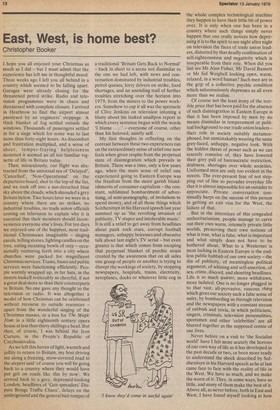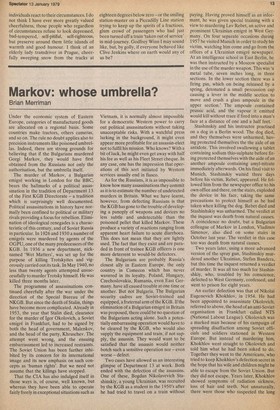East, West, is home best?
Christopher Booker
I hope you all enjoyed your Christmas as much as I did — but I must admit that the experience has left me in thoughtful mood. Three weeks ago I left you all behind in a country which seemed to be falling apart.
Garages were already closing for the threatened petrol strike. Radio and tele vision programmes were in chaos and threatened with complete closure. I arrived in Heathrow to find the airport almost paralysed by an engineers' stoppage. A thick blanket of fog settled outside the windows. Thousands of passengers settled in for a siege which for some was to last more than forty-eight hours. As discomfort and frustration multiplied, and a sense of sheer, temper-fraying helplessness mounted it seemed an all too familiar vignette of life in Britain today.
Then, miraculously, our flight was abstracted from the universal sea of 'Delayed', 'Cancelled', 'Non-Operational' on the departures board, shot to the top of the list, and we took off into a sun-drenched blue sky above the clouds, which shrouded a grey Britain below. Two hours later we were in a country where there are no strikes, no industrial troubles, no trade union officials coming on television to explain why it is essential that their members should inconvenience everyone else's lives. For ten days we enjoyed one of the happiest, most traditional Christmases imaginable — singing carols, telling stories, lighting candles on the tree, eating steaming bowls of carp — occasionally venturing forth into a city where churches were packed for magnificent Christmas services. Trams, buses and public services were functioning efficiently. People warmly wrapped up, in fur hats, in the streets looka noticeably as cheerful, if not a great deal more so than their counterparts in Britain. No one gave any thought to the television or radio. It was altogether a model of how Christmas can be celebrated without recourse to outside resources — apart from the wonderful singing of the Christmas masses, or a box for The Magic Flute in a little eighteenth century opera house at less than thirty shillings a head. But then, of course, I was behind the Iron Curtain, in the People's Republic of Czechoslovakia.
As we left this haven of light, warmth and jollity to return to Britain, my host driving me along a freezing, snow-covered road to the airport said 'of course you will be going back to a country where they would have put grit on roads like this by now'. We arrived back to a grey, depressed-looking London, headlines of 'Grit-spreaders' Dis pute Brings Traffic Chaos', delays on the underground and the general bad-temper of a traditional 'Britain Gets Back to Normal' — back in short to a scene not dissimilar to the one we had left, with news and conversation dominated by industrial troubles, petrol queues, lorry drivers on strike, food shortages, and an unending trail of further troubles stretching over the horizon into 1979, from the miners to the power workers. Somehow to cap it all was the spectacle of Clive Jenkins on television intoning a litany about his leaked smallpox report in which every sentence began with the words 'I blame . . . ' — everyone of course, other than his beloved, saintly self.
My first thoughts in reflecting on the contrast between these two experiences ran on the extraordinary sense of relief one now feels when given respite from the perpetual state of disintegration which prevails in Britain. There was a time, only a few years ago, when the main sense of relief one experienced going to Eastern Europe was the freedom from the more garish blandishments of consumer-capitalism — the constant, subliminal bombardment of advertising, of semi-pornography, of invitations to spend money, and of all those things which Solzhenitsyn in his Harvard speech last year summed up as 'the revolting invasion of publicity, TV stupor and intolerable music'. It is still a relief to get away from headlines about punk rock stars, corrupt football managers, unhappy heiresses and obsessive talk about last night's TV serial — but even greater is that which comes from escaping that perpetual blanket of psychic strain created by the awareness that on all sides one group of people or another is trying to disrupt the workings of society, by stopping newspapers, hospitals, trains, electricity, aeroplanes, docks or whatever little cog in the whole complex technological machine they happen to have their little bit of power over. It is only when one has been in a country where such things simply never happen that one really notices how depre ssing it is to the spirit to see night after night on television the faces of trade union leaders, distorted by that deadly combination of self-righteousness and negativity which is inseparable from their role. When did you last see Mr Alan Fisher, Mr David Basnett or Mr Sid Weighell looking open, warm, relaxed, in a word human? Such men are in the grip of a collective psychic condition which subconsciously depresses us all even more than we realise.
Of course not the least irony of the terrible price that has been paid for the absence of such disintegration in Eastern Europe is that it has been imposed by men by no means dissimilar in temperament or political background to our trade union leaders — their role in society suitably metamorphosed, but unmistakably wearing the same grey-faced, unhappy, negative look. With the hidden threat of power such as we can scarcely conceive of, they have lowered their grey pall of bureaucratic restriction, drabness, shortages over whole societies. Uniformed men are only too evident in the streets. The ever-present fear of not stepping out of line so pervades everyday life that it is almost impossible for an outsider to appreciate. Private conversation continually harps on the success of this person in getting an exit visa for the West, the failure of that.
But in the interstices of this congealed authoritarianism, people manage to carve out their own warm, intensely private little worlds, preserving their own notions of what is true, what is false, what is important and what simply does not have to be bothered about. What to a Westerner is most lacking in Eastern Europe is the endless public hubbub of our own society — the din of publicity, of meaningless political argument, of whining and self-assertion, of sex, crime, discord, and shouting headlines. Life is so much quieter, more withdrawn, more isolated. One is no longer plugged in to that vast, all-pervasive, raucous thing which gives our society such a false sense of unity, by bombarding us through television and the newspapers with a constant stream of rubbish and trivia, in which politicians, singers, criminals, television personalities, sportsmen and other 'celebrities' are all blurred together as the supposed centre of our lives.
Never before on a visit to 'the Socialist world' have I felt more acutely the horrors of our own way of life as it has developed in the past decade or two, or been more ready to understand the shock described by Solzhenitsyn in his Harvard speech as he at last came face to face with the reality of life in the West. We have so much, and we make the worst of it. They, in some ways, have so little, and many of them make the best of it. Above all, as never before, both in East and West, I have found myself looking at how individuals react to their circumstances. I do not think I have ever more greatly valued cheerfulness, those people who regardless of circumstances refuse to look depressed, bad-tempered, self-pitiful, self-righteous, but preserve around them little islands of warmth and good humour. I think of an elderly lady tramdriver in Prague, cheerfully sweeping snow from the tracks at eighteen degrees below zero — or the smiling station-master on a Piccadilly Line station trying to keep up the spirits of a fractious, glum crowd of passengers who had just been turned off a train 'taken out of service' in mid-journey. Godfrey Winn I may sound like, but, by golly, if everyone behaved like Clive Jenkins where on earth would any of us be?



































 Previous page
Previous page